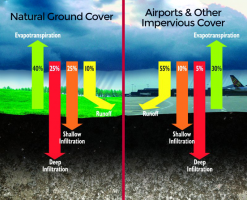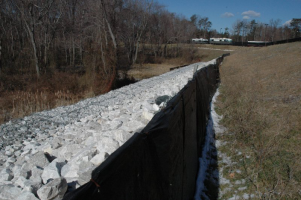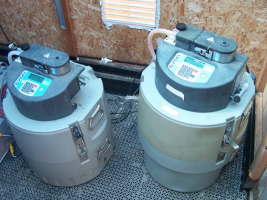What is stormwater?
Stormwater is the runoff from the surface of the land, rooftops, and pavement resulting from rainfall or snowmelt.
When stormwater washes over these surfaces or comes in contact with materials that are stored outside, it can pick up pollutants that can then be carried to storm sewers. These storm sewers drain untreated stormwater to our local creeks and rivers where they can impact water quality and harm wildlife.
Many of the activities that occur at BWI Marshall or Martin State Airports have the potential to impact stormwater quality. Essentially, if your activity occurs outside and is exposed to the elements, you can have an impact on stormwater quality.
Some examples of activities that can impact stormwater quality include:
- Aircraft and runway or taxiway deicing
- Aircraft and ground vehicle maintenance
- Vehicle and equipment cleaning
- Hazardous materials use, storage, and disposal
- Aircraft and ground vehicle fueling
- Tenant trash disposal
- Restaurant waste disposal
You can help the MAA minimize stormwater pollution by:
- Following existing pollution prevention (P2) activities and looking for opportunities to institute new practices, including selecting products and processes that are less harmful to the environment.
- Follow proper spill prevention procedures. Being alert for oil spills or leaks in outdoor areas that could cause stormwater pollution. Promptly report or correct any spills or leaks.
- Reporting any stormwater drains or culverts that appear to be clogged or not functioning properly.
- Manage hazardous waste appropriately. Storing materials and equipment indoors or under cover with proper secondary containment where possible.
Stormwater runoff is regulated by the Maryland Department of the Environment (MDE) and the Environmental Protection Agency (EPA). Industrial sites such as BWI Marshall and Martin State Airports must have a National Pollutant Discharge Elimination System (NPDES) permit for stormwater. These permits are issued by MDE and define all the conditions that must be met for stormwater discharges. The MAA is the permit holder for BWI Marshall and Martin State Airports and is therefore legally responsible for all stormwater discharges from all activities on airport property, regardless of their source.
The permit addresses a variety of activities ranging from industrial discharges, (i.e., deicing, vehicle maintenance, equipment cleaning) to pollution prevention, to construction.
Although the MAA is the permit holder, tenants are covered under the permit because there are many activities that tenants are involved with that impact stormwater and, consequently, permit compliance. As such, the MAA has a number of tenant directives in place that detail specific requirements for tenants in association with these activities.
The MAA being the permit holder saves tenants the administrative burden of the permit process; however, it is important for MAA and tenants to work as a team to maintain permit compliance.
Aside from potential impacts to the tenant’s lease agreement, the tenant may impact MAA’s permit compliance. The MAA will work with the tenant to identify ways that the tenant can rectify the situation. If the tenant doesn’t make these changes in a timely manner then the MAA is legally obligated to contact MDE who may issue fines or penalties for non-compliance.
One of the requirements of tenant leases is that tenants must adhere to the requirements of the applicable tenant directives and associated regulations. Not adhering to these requirements can impact the standing of the tenant lease.
Additionally, many of the best management practices identified above are those included in the SWPPP, which is applicable to both the MAA and tenants at the airport. Not implementing best management practices in association with tenant activities may result in the contamination of stormwater at the airport. The MAA is legally obligated to report any illegal discharges to MDE who may issue fines or penalties for non-compliance with the Clean Water Act and the NPDES Permit. This may result in civil or criminal penalties (see Part II.C.15 and 16 of the stormwater permit for more detail)
There are a number of environmental regulations that are applicable to stormwater discharges at the airports. Maryland regulations include:
- COMAR 26.08.04 – Regulations pertaining to NPDES permits
- COMAR 26.17.01 – Regulations pertaining to erosion and sediment control
- COMAR 26.17.02 – Regulations pertaining to stormwater management
Federal regulations include:
- 40 CFR 122, 123, 124, and 125 – Regulations pertaining to the NPDES
Maryland regulations also reference the following documents for construction:
- Maryland Stormwater Design Manual, Vols. I and II (Maryland Department of the Environment, April 2000)
- Maryland Erosion and Sediment Control Guidelines for State and Federal Projects




